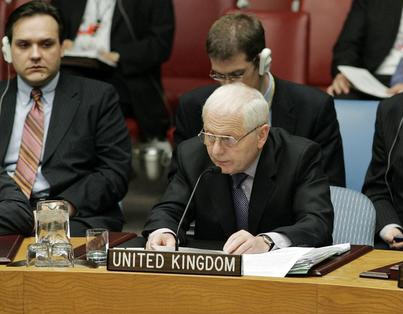 Calling for a shared commitment from the Democratic Republic of the Congo's (DRC) authorities and political parties to national reconciliation, the Security Council today deplored the recent wave of deadly violence in the African country's capital and urged all sides to resolve their difference through dialogue.
Calling for a shared commitment from the Democratic Republic of the Congo's (DRC) authorities and political parties to national reconciliation, the Security Council today deplored the recent wave of deadly violence in the African country's capital and urged all sides to resolve their difference through dialogue.
In a statement read out by Ambassador Emyr Jones Parry of the United Kingdom, which holds this month's rotating presidency, Council members stressed the legitimacy of the DRC's recently democratically elected institutions, such as the Government of President Joseph Kabila.
At the same time, the 15-member panel said it was important that these institutions operate with respect for the rule of law, human rights and international humanitarian law, and avoid any unnecessary or disproportionate force.
The UN peacekeeping mission in the DRC, known as MONUC, estimates that hundreds of people were killed and many more wounded during several days of violence that began in the Gombe district of Kinshasa on 22 March between Government forces and guards of former vice-president Jean-Pierre Bemba, who was defeated last year by Mr. Kabila in the run-off round of landmark presidential elections.
Today's Council presidential statement deplored that violence, expressing regret also at the destruction and pillaging that took place - including of some diplomatic missions in Kinshasa - during the clashes.
It called on MONUC and Congolese authorities to undertake the necessary investigations into what happened, encouraged all political sides in the DRC to remain committed to the political process, and emphasized the value of continued international support.
The DRC is rebuilding following the end of a six-year civil war, widely considered the most lethal conflict in the world since World War II, which cost 4 million lives in fighting, hunger and disease. Last year's presidential and parliamentary elections were the first polls of their kind in more than four decades.
Mr. Jones Parry added that Council members welcomed a declaration by the Conference of Presidents of the Congolese National Assembly following the violence in which all parliamentary groups reaffirmed their commitment to supporting the democratic process.
They also noted a communiqué of the African Union (AU) Peace and Security Council on 24 March and a separate communiqué from the Extraordinary Summit of the Southern African Development Community (SADC) Heads of State and Government in Dar-es-Salaam on 28-29 March reaffirming the sovereign right of the DRC to have a single national army and for all other armed groups to be integrated into the military or demobilized.
The presidential statement emphasized the need for continuing peace consolidation in the DRC, especially in the field of security sector reform.
Related articles
- • UK Suspends Financial Aid to Rwanda Over M23 Rebellion (February 25, 2025)
- • UN Security Council Calls on Rwanda to Stop Supporting M23 Rebels in DR Congo (February 22, 2025)
- • Felix Tshisekedi Sworn In as DR Congo President (January 24, 2019)
- • Constitutional Court Declares Tshisekedi Winner of Presidential Election (January 19, 2019)
- • Felix Tshisekedi Vows to Be the President of All Congolese (January 10, 2019)
- • Felix Tshisekedi Elected DR Congo President (January 10, 2019)
- • DR Congo Delays Results of December Election (January 6, 2019)
- • Botswana Urges Joseph Kabila to Step Down (February 26, 2018)
- • No elections in DR Congo in December without electronic voting machines: INEC (February 13, 2018)
- • US Warns DR Congo Against Electronic Voting for Delayed Election (February 12, 2018)
- • Felix Tshisekedi accuses INEC of illegally prolonging Kabila's mandate (October 24, 2017)
- • DRC Seeks Arrest of Presidential Candidate Moise Katumbi (May 19, 2016)
- • Papa Wemba Is Buried in Kinshasa (May 4, 2016)
- • Papa Wemba Awarded Highest National Honor as Thousands Pay Tribute (May 2, 2016)
- • Rights Groups: DR Congo Must Free Pro-democracy Activists (April 13, 2015)
- • Police Open Fire on Crowd Protesting Election Law Change (January 19, 2015)
- • Etienne Tshisekedi Evacuated to Belgium for Medical Treatment (August 16, 2014)
- • Southern African Leaders to Meet in Zimbabwe (August 15, 2014)
- • Kerry Calls on Kabila to Honor Constitution (May 4, 2014)
- • Kerry in DR Congo for Security Talks (May 3, 2014)
- • DR Congo Takes Chairmanship of COMESA at Summit in Kinshasa (February 26, 2014)
- • New DR Congo amnesty law welcomed by UN envoys (February 5, 2014)
- • DR Congo, M23 Rebels Sign Declarations Marking End of Kampala Peace Talks (December 12, 2013)
- • DR Congo Honors Nelson Mandela, Hero and Model for Humanity (December 6, 2013)
- • Congo Army Takes Control of Mbuzi Hill From M23 Rebels (November 4, 2013)
- • Kabila Congratulates Congo Army for Defeating M23 Rebels (October 30, 2013)
- • DR Congo Will Defend Itself Against an Attack by Rwanda, Government Says (August 31, 2013)
- • UN Security Council debate focuses on peace efforts for Africa's Great Lakes region (July 25, 2013)
- • DR Congo Eases Process for Starting a New Business (June 3, 2013)
- • Warlord Bosco Ntaganda Turns Himself In at US Embassy in Rwanda (March 18, 2013)
Tags: |







